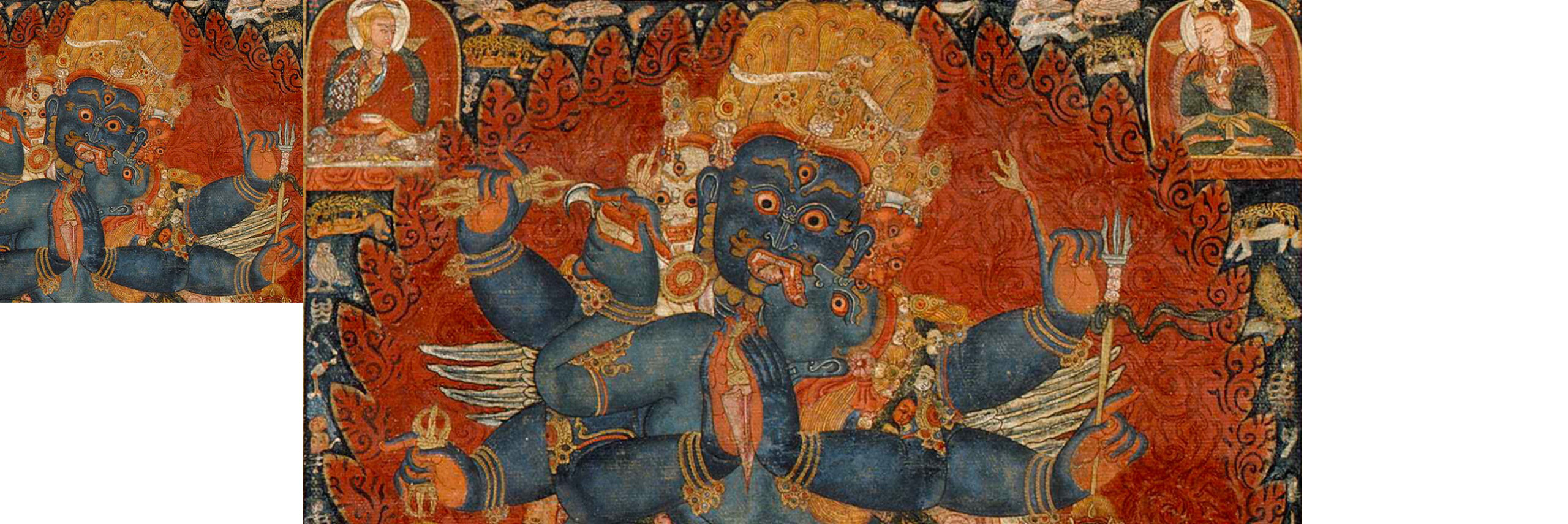
Padmasambhava and History
Padmasambhava Seminar
Sunday, October 14, 2018
10:00 AM–11:30 AM
Presented by Gray Tuttle
Discussants: Jacob Dalton and Lewis Doney
Facilitator: Benjamin Bogin
While Padmasambhava is frequently described as a pivotal figure in the arrival and acceptance of Buddhism in imperial Tibet, no documents that are clearly contemporary with the Tibetan empire mention him. For instance, though later legends associate him strongly with Tibet’s first monastery, Samye, and its sponsoring emperor, Tri Songdetsen (active in late 8th century), neither the inscriptions on bells or stele from the monastery nor the emperor’s 42-year reign mention him. The earliest Tibetan manuscripts from a cave at Dunhuang that was closed around the year 1,000 do not record any of the rich narratives about Padmasambhava. They appear in the 12th-century biography of this figure, which remains the earliest account of his life. The presenter will question Tibetan studies scholars treating Padmasambhava as a historical figure. The respondents will suggest alternative views on the “historicity” of Padmasambhava and engage in a constructive debate about the historical significance of this figure.
Seminar tickets include admission to the Rubin’s exhibitions, including The Second Buddha: Master of Time.
Support for the seminar was provided by the Chiang Ching-Kuo Foundation for International Scholarly Exchange
About the Speakers
Gray Tuttle, PhD, studies the history of 20th-century Sino-Tibetan relations as well as Tibet’s relations with the China-based Manchu Qing Empire. The role of Tibetan Buddhism in these historical relations is central to all his research. In his book Tibetan Buddhists in the Making of Modern China (Columbia University Press, 2005), he examines the failure of nationalism and race-based ideology to maintain the Tibetan territory of the former Qing empire as integral to the Chinese nation-state. He argues that a new sense of pan-Asian Buddhism was critical to Chinese efforts to hold onto Tibetan regions (one quarter of China’s current territory). His current research project, “Amdo Tibet, Middle Ground between Lhasa and Beijing (1578″“1865),” is a historical analysis of the economic and cultural relations between China and Tibet in the early modern periods (16th”“19th century), when the intellectual and economic centers of Tibet shifted to the east to Amdo—a Tibetan cultural region the size of France in northwestern China. Deploying Richard White’s concept of the “Middle Ground” in the context of two mature civilizations—Tibetan and Chinese—encountering one another, this book will examine how this contact led to three dramatic areas of growth that defined early modern Tibet: 1) the advent of mass monastic education, 2) the bureaucratization of reincarnate lamas’ charisma, and 3) the development of modern conceptions of geography that reshaped the way Tibet was imagined.
Jacob Dalton, PhD, is Khyentse Foundation Distinguished University Professor in Tibetan Buddhism at UC Berkeley. He holds a joint appointment in South and Southeast Asian Studies and East Asian Languages and Cultures and teaches Tibetan Buddhism. After working for three years (2002″“2005) as a researcher with the International Dunhuang Project at the British Library, he taught at Yale University (2005″“2008) before moving to Berkeley. He works on tantric ritual, Nyingma religious history, paleography, and the Dunhuang manuscripts. He is the author of The Taming of the Demons: Violence and Liberation in Tibetan Buddhism (Yale University Press, 2011), The Gathering of Intentions: A History of a Tibetan Tantra (Columbia University Press, 2016), and co-author of Tibetan Tantric Manuscripts from Dunhuang: A Descriptive Catalogue of the Stein Collection at the British Library (Brill, 2006). He is currently working on a study of tantric ritual in the Dunhuang manuscripts.
Lewis Doney, PhD, is Associate Professor in the History of Religions (Buddhism) at NTNU Trondheim.He received his MA and PhD from SOAS, London, in 2004 and 2011 before conducting postdoctoral research on Tibet at LMU Munich, the Free University Berlin and the British Museum. His publications includeThe Zangs gling ma: The First Padmasambhava Biography(2014), and for the last year he has been acting as Replacement Professorial Chair of Central Asian Language and Culture at the University of Bonn.
Suggested Readings
Bischoff, F. A. 1978. “Padmasambhava est-il un personnage historique?” In Proceedings of the Csoma de Körös Memorial Symposium Matrafüred, Hungary, 24″“30 September 1976, edited by L. Ligeti, 27″“34. Budapest: Akadémiai Kiadó.
Blondeau, A. M. 1980. “Analysis of the Biographies of Padmasambhava According to Tibetan Tradition: Classification of Sources.” In Tibetan Studies in Honour of Hugh Richardson, edited by Michael Aris and Aung San Suu Kyi, 45″“52. Warminster, England: Aris and Phillips Ltd.
Cantwell, C., and R. Mayer. 2013. “Representations of Padmasambhava in Early Post-Imperial Tibet.” In Between Empire and Phyi dar: The Fragmentation and Reconstruction of Society and Religion in Post-Imperial Tibet, edited by R. Mayer, et al., 19″“50. Lumbini: Lumbini International Research Institute.
Dalton, J. 2004. “The Early Development of the Padmasambhava Legend in Tibet: A Study of IOL Tib J 644 and Pelliot tibétain 307.” Journal of the American Oriental Society 124.4: 759″“772.
Doney, L. 2014. The Zangs gling ma: The First Padmasambhava Biography. Two Exemplars of its Earliest Attested Recension. Andiast: International Institute for Tibetan and Buddhist Studies.
Hirshberg, D. A. 2016. Remembering the Lotus-Born: Padmasambhava in the History of Tibet’s Golden Age. Somerville, MA: Wisdom Publications.
Kapstein, M. T. 2000. The Tibetan Assimilation of Buddhism: Conversion, Contestation, and Memory. Oxford: Oxford University Press.
Ticket per Session: $20.00
Member Ticket per Session: $16.00
Seminar Tickets: $65.00
Seminar Member Tickets: $52.00
Seminar Student Tickets: $25.00
Have any questions? Contact the Museum Box Office at 212-620-5000 ext. 344 or email us at boxoffice@rubinmuseum.org.

